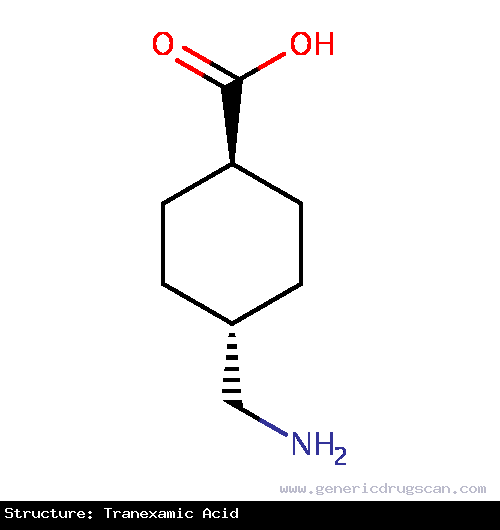Tranexamic Acid Drug: Indication, Dosage, Precaution, Side Effect , Storage, Category Type and corresponding Brands - www.genericdrugscan.com
Tranexamic Acid
Drug Status in USA : ApprovedDrug Status in Canada : Approved
pronunciation
pronounced as (tran'' ex am' ik) (as' id)
Why is this medication prescribed?
Tranexamic acid is used to treat heavy bleeding during the menstrual cycle (monthly periods) in women. Tranexamic acid is in a class of medications called antifibrinolytics. It works to improve blood clotting.
How should this medicine be used?
Tranexamic acid comes as a tablet to take by mouth. It is usually taken with or without food three times a day for up to 5 days during monthly menstruation. You should begin taking this medication each month when your period starts. Do not take tranexamic acid when you do not have a period. Take tranexamic acid at around the same times every day you are to receive a dose. Follow the directions on your prescription label carefully, and ask your doctor or pharmacist to explain any part you do not understand. Take tranexamic acid exactly as directed. Do not take tranexamic acid tablets for more than 5 days in a menstrual cycle or take more than 6 tablets in a 24 hour period of time.
Swallow the tablets whole; do not split, chew, or crush them.
Tranexamic acid is used to decrease the amount of blood lost during your monthly period but does not stop menstrual bleeding. Call your doctor if your bleeding does not improve or gets worse during your treatment.
Ask your pharmacist or doctor for a copy of the manufacturer's information for the patient.
What are the precautions to be followed?
Before taking tranexamic acid,- tell your doctor and pharmacist if you are allergic to tranexamic acid, any other medications, or any of the ingredients in tranexamic acid tablets. Ask your pharmacist for a list of the ingredients.
- tell your doctor if you are taking hormonal contraceptives (birth control pills, patches, rings, and injections). Your doctor will probably tell you not to take tranexamic acid if you are taking this medication.
- tell your doctor and pharmacist what other prescription and nonprescription medications, vitamins, nutritional supplements, and herbal products you are taking or plan to take. Be sure to mention any of the following: certain medications used to improve blood clotting including Factor IX complex concentrate (AlphaNine SD, Bebulin VH, Benefix, Mononine, Profilmine SD) and activated prothrombin complex concentrate (Feiba NF); and tretinoin. Tell your doctor you are taking tranexamic acid if you will be receiving medications to treat blood clots, including tissue plasminogen activators such as alteplase (Activase) and reteplase (Retavase). Your doctor may need to change the doses of your medications or monitor you carefully for side effects.
- tell your doctor if you have or have ever had a blood clot, if you have a blood clotting condition, or if you have been told you are at risk of having a blood clot. Your doctor will probably tell you not to take tranexamic acid.
tell your doctor if you have or have ever had kidney disease. Also tell your doctor if the time between the start of your menstrual periods is less than 21 days or more than 35 days.
- tell your doctor if you are pregnant, plan to become pregnant, or are breast-feeding. If you become pregnant while taking tranexamic acid, call your doctor.
- if you are having surgery, including dental surgery, tell the doctor or dentist that you are taking tranexamic acid.
What are possible side effects of this medication ?
Tranexamic acid may cause side effects. Tell your doctor if any of these symptoms are severe or do not go away:- headache
- tiredness
- sinus pain
- back pain
- stomach pain
- bone, joint, or muscle pain
- hives
- rash
- itching
- difficulty breathing or swallowing
- swelling of the face, throat, tongue, lips, eyes, hands, feet, ankles, or lower legs
- hoarseness
- changes in vision, including color vision
- chest pain
- shortness of breath
- leg pain, swelling, tenderness, redness, or warmth
Tranexamic acid may cause other side effects. Call your doctor if you have any unusual problems while taking this medication.
How to store the medication and dispose it of after its use later?
Keep this medication in the container it came in, tightly closed, and out of reach of children. Store it at room temperature and away from excess heat and moisture (not in the bathroom). Throw away any medication that is outdated or no longer needed. Talk to your pharmacist about the proper disposal of your medication.
Drug Category/Class
- Antifibrinolytic Agents
- Blood and Blood Forming Organs
- Antihemorrhagics
- Amino Acids
- Amino acids
| Prescribed | For use in patients with hemophilia for short term use (two to eight days) to reduce or prevent hemorrhage and reduce the need for replacement ther... |
| Weight : | 157.2102 |
| Structure | Tranexamic Acid |
 | |
| Formula | C8H15NO2 |
Tranexamic Acid has 119 Brands listed
Search Generic Drugs alphabetically
